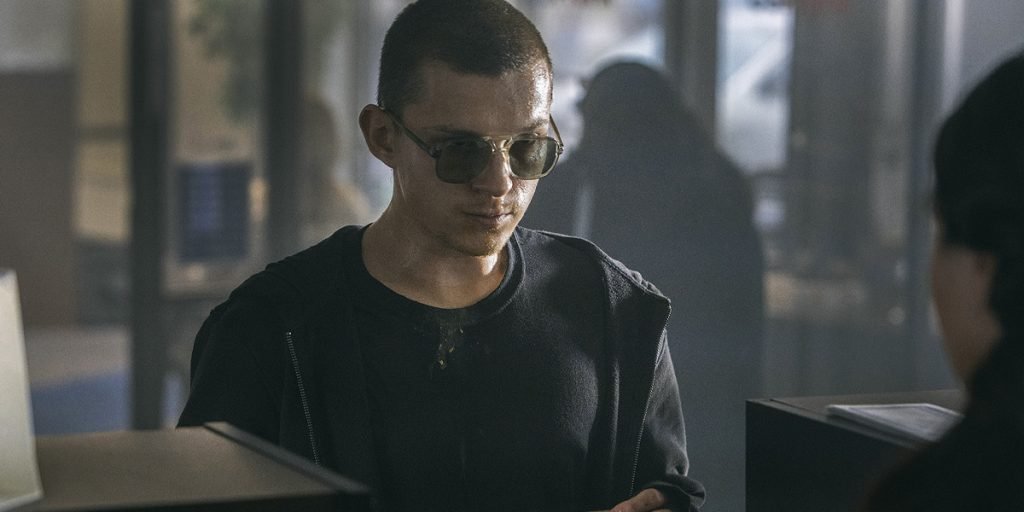Cherry is a towering American tragedy, tackling topics like PTSD and the opioid epidemic with earnestness and highlighting Tom Holland ’s best work to date.
Though Tom Holland first burst onto the Hollywood scene with 2012’s The Impossible –starring as the 12-year-old son of Naomi Watts’ María Belón in the retelling of the Belón family’s traumatic experience during the 2004 Indian Ocean tsunami – it wasn’t until his standout supporting turn as Spider-Man in 2016’s Captain America: Civil War that the world truly became aware of his titanic talent. His work as the widely adored web-slinger was instantly iconic, as he capably channeled both the childlike charm and the winning wit that fans have come to know and love about character, amassing much acclaim and admiration that would in turn generate effusive excitement for the next year’s Spider-Man: Homecoming – his first solo gig as Spidey. Naturally, Holland knocked that out of the park as well, perfecting his portrayal of the cheeky wall-crawler and asserting his interpretation of the role as the definitive depiction across all mediums, earning even more fervent followers after being featured in Avengers: Infinity War and Avengers: Endgame.
However, in spite of all his “superheroic” success, Holland is using his latest movie, Cherry, to prove himself as a “serious actor” – one who can be so much more than just “your friendly neighborhood Spider-Man.” Initially, audiences may worry about such a wish; far too many actors take their initially appealing image for granted, attempting to “reinvent” themselves into an “edgier” figure that soon becomes entirely unrecognizable to their fans. It makes sense for Holland to desire to differentiate his work and challenge himself creatively, but even at the risk of alienating those who made him the star he is? Thankfully, while the material here may be much more mature than anything you’d find in a Marvel film, one thing remains constant – Holland’s commendable commitment to his characters. And with Cherry, he’s certainly got his work cut out for him.
As the titular tortured soul, Holland’s “Cherry” starts the story by coolly drifting through college, seemingly without a care in the world. He’s not really sure what he wants to do with his life, he’s restrained in a loveless relationship with his “high school sweetheart,” and he’s just simply stuck. That is, until he comes across the effervescent Emily (Ciara Bravo, Neighbors 2: Sorority Rising and To the Bone), a classmate who he is almost instantly enamored with. One meet cute and a few flirting sessions later, the pair is off on an adorable whirlwind love affair. Unfortunately, this fling is short-lived, as Emily later announces her intentions to travel to Toronto to work and finish her education, leaving Cherry behind, heartbroken and hopeless. With nowhere left to turn, he’s sucked into the allure of enrolling in the army after seeing friends pursue this same path and believing it will give him a “purpose.”

Unsurprisingly, war is hell, and whether he’s enduring severe abuse from his superiors or watching his closest friends become casualties on the battlefield, Cherry finds that his experiences in Iraq forever alter who he is as a human being. Upon returning home, he reconciles with Emily and the two try to begin anew, but as Cherry is plagued by PTSD, he struggles to see any way he can ever lead a normal life ever again. Though he tries to seek the support of doctors, they only offer one solution – opioids. And, as soon as Cherry starts taking them, he can’t stop. When Emily joins Cherry in his drug habits to cope with living alongside a PTSD-afflicted addict, the two descend into a deep and dark downward spiral, soon even turning to robbing banks to fund their chaotic cravings. Can Cherry and Emily ever turn their lives around again and put a stop to their strife, or are the two simply destined to self-destruct?
At 140 minutes, Cherry is a lot of movie, and you wouldn’t be faulted for finding it to be a bit of an exhausting affair at one point or another. Aside from the amiable first act – which primarily details Cherry and Emily’s initial innocent interactions and their later love-fueled liaisons – the film takes us down a rabbit hole of some of the worst events a human can ever experience, so it’s hardly a “light” watch by any stretch of the imagination. Nevertheless, for the most part, the story is still sturdily structured and continually compelling in spite of the displeasing subject matter depicted on screen, and for that, praise must be paid to screenwriters Jessica Goldberg (Hulu’s The Path) and Angela Russo-Otstot. These two women don’t shy away from any struggle that Cherry endured – showcasing his turmoil in its totality without ever seeming exploitative or excessively provocative by any means – and this candor is completely commendable, adding to the authenticity of his odyssey overall.
Some may say that the second act – the stretch set during the Iraq War – feels a tad long in the tooth (even if the wrap up is admittedly expertly unsettling), but Goldberg and Russo-Otstot manage to rebound with a terrific third act that matches – and maybe even surpasses – the film’s aforementioned phenomenal prelude. Cherry and Emily’s drug-fueled ruination is brutal to behold but riotously riveting all the same, and many movie fans will notice that their pains almost perfectly parallel the distressing downfall of Ray Liotta and Lorraine Bracco’s Henry and Karen Hill in Goodfellas as they descend into delirium. Likewise, Cherry’s resulting decision to rob banks leads to a surplus of suspenseful sequences that Goldberg and Russo-Otstot skillfully sketch out for maximum entertainment value and emotional effect, and the two maintain this frenetic high all the way to the film’s finale.
When the time comes for consequences, Goldberg and Russo-Otstot are refreshingly frank about what awaits Cherry while concurrently condemning the system that sent this young man to war and subsequently threw him back into American society with no attempt at rehabilitation whatsoever. Cherry should absolutely be held accountable for his actions, but it’s undeniably impressive that Goldberg and Russo-Otstot simultaneously shame those who set him on this path as well. Left and right, Cherry was used and abused by imperious institutions to further their own aims – the U.S. government viewed him as no more than another body to move around in a moment’s notice in battle, and the health care industry saw the psychologically disturbed vet as a potential customer. This maniacal manipulation is indefensible, and Goldberg and Russo-Otstot cogently call it out without hesitation.
In his first major “adult” role, Holland is dynamo beyond any doubt, tapping into an aching anguish that one would not think a 24-year-old could plausibly personify onscreen – and yet, he defies the odds, time and time again. There isn’t a single scene where Holland isn’t fully attuned to Cherry’s inner agony, and he empathetically evolves alongside the character throughout the film, convincingly charting his torment through his initial listlessness in life to his mental mutilation from PTSD to his devouring desire for drugs and so on and so forth. At each stage in Cherry’s struggles, Holland strays from superficiality, delving into the depths of his character’s dolor and mining this misery to root the part in reality instead of giving in to “showier” sensibilities. This isn’t to say that Holland is afraid to “go big” if the moment calls for theatrics, but rather just that he leans on legitimacy in his performance more than tawdry “ticks” and “tricks” that one may associate with a “mentally disturbed drug addict.” He’s much too professional to play Cherry without this credibility.
As the apple of Cherry’s eye – and his later partner-in-crime – Ciara Bravo meets Holland’s die-hard devotion to the film marvelously with her own equally energetic supporting turn that proves as alluring to us in the audience as it is to Cherry himself. From the first moment Holland’s Cherry spots Bravo’s Emily sitting in class, there’s this delicate and delightful “girl next door”-esque quality to her; she’s got spunk, but she’s sweet to her core, and Bravo is effortlessly endearing in these introductory scenes. Sadly, as she and Cherry lose their way over the course of the film, this sweetness subsides, and it’s replaced by a dreadful desperation and despair – a transformation that Bravo textures tenderly, without bluster or bombast. It’s terribly tragic to watch this once bright young woman become so wrapped up in Cherry’s chaos simply out of her persistent passion for her partner, but Bravo makes this reverence feel rational the whole way through, which is no small feat.
Breaking away from blockbuster filmmaking after basically shooting Captain America: The Winter Soldier, Captain America: Civil War, Avengers: Infinity War, and Avengers: Endgame back-to-back-to-back-to-back, directors Anthony and Joe Russo show that they are just as skilled at shepherding an intimate indie drama as they are at managing monumental action extravaganzas – though their grasp on grandeur certainly injects intensity in the war and robbery scenes quite impressively. Editor Jeff Groth (Joker, War Dogs) keeps the epic moving at an expedient pace for the most part, and he’s additionally successful at assuring that the “sections” of the story feel separate from another while still contributing to the coherent whole of the film. Finally, one would be remiss to not also acknowledge Henry Jackman’s (Captain America: Civil War, Captain Phillips) stunning score, which sumptuously stresses the seriousness of Cherry at every turn.
Cherry defies description – it’s part romantic drama, part war epic, part crime thriller, and part character study – but all you need to know is that it’s simply a strikingly stirring piece of storytelling that must be seen to be believed. It’s a tough watch – and it will likely test the patience of most mainstream audiences – but those who stick it out will be rewarded with an enthralling exploration into the life of a misguided man who was chewed up and spit out by the very systems that are put in place to protect us. And, if you get nothing else out of the film, you should at least walk away agreeing that Tom Holland should have no problem affirming himself as an “adult actor” going forward, if his work here is any indication.
Cherry is now available to watch on Apple TV+.

